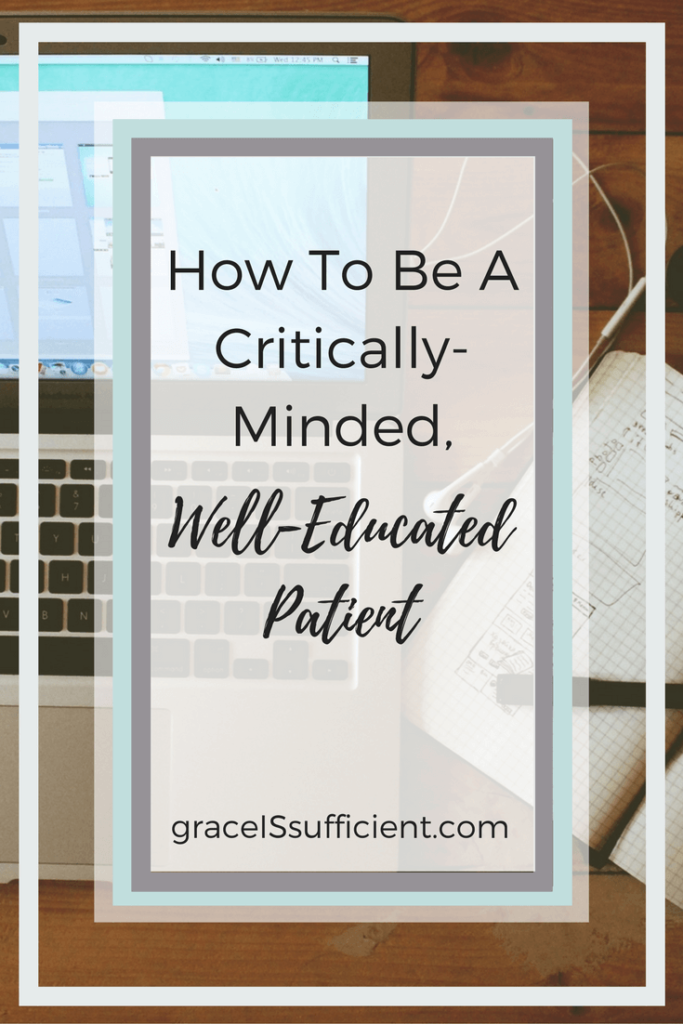Where do you get your information about your illness? What resources have you used? Internet? Books? Medical journals? Now, where do they get their information? The sea of resources we have available to us can be quite overwhelming. It’s imperative that you learn how to be a bit critical and become a well-educated patient as you search for knowledge about your illness.
BOOKS & ARTICLES
Some of us go the old-fashioned route of paper and bindings. Do a little research on the author. Are they known for the products they’re trying to sell or are they a noted doctor in the field of your illness? Proceed with caution when reading medical books from an author who has a list of products to sell under their name.
INTERNET SEARCHES
Have you heard of Google Scholar? If you Google “Google Scholar” you’ll be taken to a search engine that is simply research oriented. You can then search for studies on your illness or anything you desire. You can even get as specific as you want such as “effects of fiber on diabetes patients.” You’ll see a brief description of the article as well as the date it was written. Watch for recent studies – at least in the past five years.
Watch the suffix of the website. Anything that is .edu is an educational organization like a school or university and you can normally look at those as reliable sources. The .gov sites are federal, state or local government sites and are highly regulated. Non-profit organizations are .org and are usually reputable. The .com’s are commercial sites and can include people trying to sell products; be skeptical when looking at these. (Keep in mind that these are just generalities. For instance, the Mayo Clinic is highly reliable but is a .com). There are also quite a few good .com’s. Take mine for instance. 🙂 LOL – There are a number of other great bloggers out there that have .com’s as well!
RESEARCH STUDIES
- The first thing to find out is who was studied. Did they use the current diagnostic criteria when choosing their participants? If they didn’t use up to date standards they aren’t going to be getting beneficial results. You also have to be sure they have a control group that excluded patients with similar illnesses or illnesses that have similar symptoms. For instance, if they are trying to study the benefits of yoga on fibromyalgia patients they may want to exclude people with lupus and rheumatoid arthritis. They would also want to exclude people who are currently under any type of litigation that concerns their illness. Those individuals could be biased in their disclosure of how the treatment affected them.
- How many people participated in the study? You’re sure to have a more accurate study by having more participants. Just including ten people isn’t going to be as good as a study that included 4,000.
- Where did they go to recruit participants? If it was a pain clinic that provided all the participants; their results may be skewed because they’re studying only those at the worst end of the spectrum; as opposed to those that are out functioning at a higher rate, such as holding down full-time jobs etc.
- Who were the researchers? Most researchers have a bias regarding what they expect to find. If I think Tai Chi has benefits for arthritis patients I’m going into my research study trying to prove that I’m right. Look for well-known researchers in regard to pain and pain management. Those individuals that have dedicated their careers to helping people in pain are more likely to hold their commitment to sincerely help people above their desire to be right.
- Who funded the study? Most medication studies are funded by pharmaceutical companies. They’re in it for the money. They are conducting the study for the sheer purpose of getting their drugs on the market.
- Was the study double-blind, placebo-controlled? A double-blind study is where neither the person administering the medication or the patient knows if they were given the placebo or the actual medication. Sometimes this is very hard to accomplish.
- Has the study been replicated? The only clear way to know if a certain study showed beneficial results is if you are able to replicate it. Medical journals are quick to publish the newest, greatest findings in medicine. The only problem with that is they rarely publish studies where more researchers try to replicate a particular study and are not able to come up with the same findings.
PLACEBO EFFECT
I’m sure you’re aware of placebos being used in research studies. That’s where they may give a certain drug to half of the participants and the other half would basically be given a sugar pill. In order for a drug company to claim that a drug is effective for a certain disease it simply has to work better than the placebo on the tested individuals. In general, 35% of individuals will show positive results during a study even though they were simply given the placebo and were never given actual medication. Therefore, the placebo effect is generally 35% or so of those studied. As an example, let’s say after a research study has laid out all their results, 32% of those given the placebo felt better; compared to 41% of those that were actually given the drug. The drug company can now promote the drug to the FDA as beneficial to patients with that illness. That could actually mean that only 9% showed benefits from the drug since 32% felt better by simply thinking they had ingested the medication.
There are actually other placebo studies that don’t use medications. They have done studies on the effects of acupuncture on individuals and had a control group that actually had a placebo treatment. The tubes containing the needles simply suctioned cupped to the participant’s skin without the needle penetrating. Believe it or not, there have also been placebo surgeries. For instance, while studying the benefits of a certain surgery on carpal tunnel they may have volunteers that don’t know if they are actually having the surgery or not. Those in the placebo group simply receive an incision that mimics that of the actual surgery. They get their stitches and are sent home thinking they had surgery.
BEWARE OF LABELS
A study or information source can use the word “significant” very loosely. It can simply mean important or it can mean the effect of a certain treatment was merely above 0. Look for resources that actually disclose a percentage rate. If they don’t, that could mean their results were beneficial in only .05% of those studied and with those findings they label it as a significant benefit.
So I hope this helps you become a more critical, well-educated patient. After all,
[clickToTweet tweet=”The strongest advocate for your health should be you! #healthadvocate #spoonie #chronicillness” quote=”The strongest advocate for your health should be you! ” theme=”style2″]





